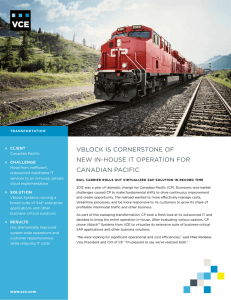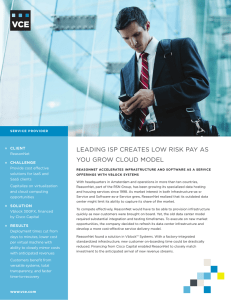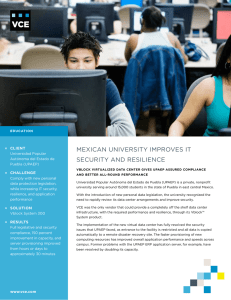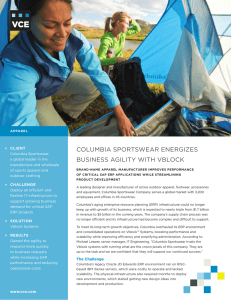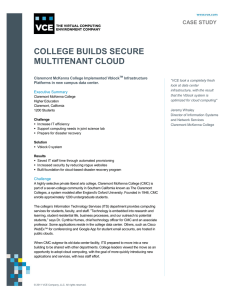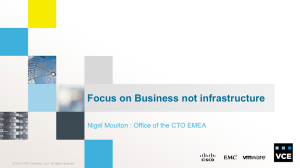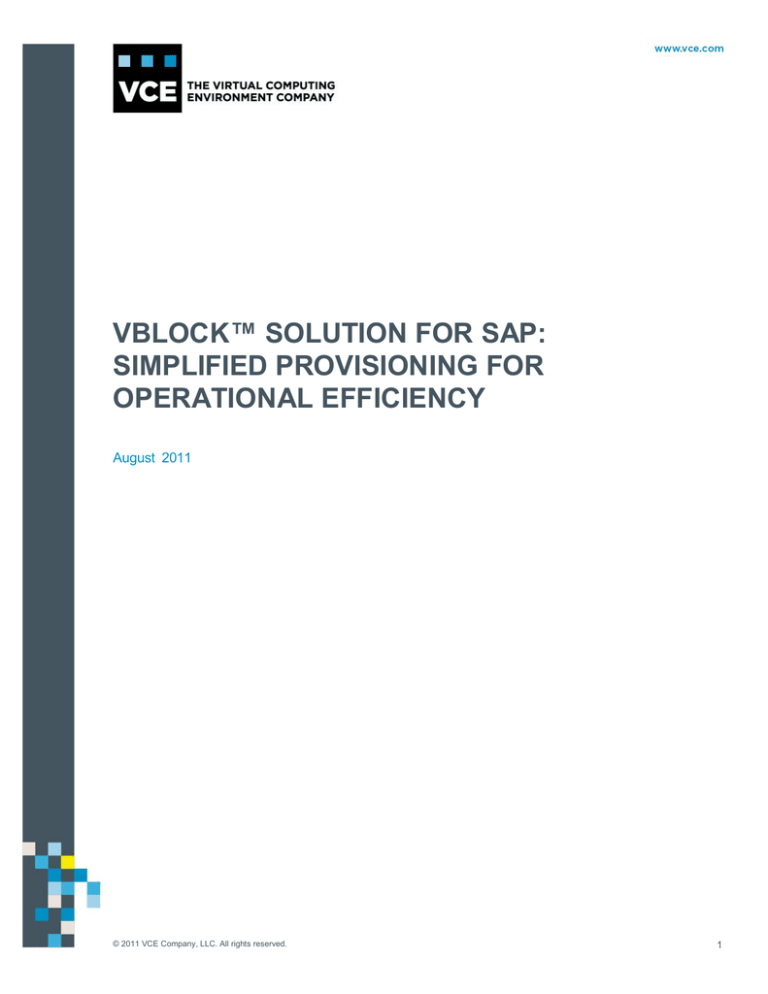
VBLOCK™ SOLUTION FOR SAP:
SIMPLIFIED PROVISIONING FOR
OPERATIONAL EFFICIENCY
August 2011
© 2011 VCE Company, LLC. All rights reserved.
1
Table of Contents
Introduction ........................................................................................................................................... 3
Purpose .......................................................................................................................... 3
Audience ........................................................................................................................ 3
Scope ............................................................................................................................. 3
Vblock™ Infrastructure Platform Introduction..................................................................................... 4
What is a Vblock Platform? ............................................................................................. 4
Vblock components ........................................................................................................ 4
Vblock Platform benefits ................................................................................................. 5
Vblock Platform automation ............................................................................................ 6
Service profiles ............................................................................................................... 7
Service profile templates................................................................................................. 7
Zoning ............................................................................................................................ 7
Learn more about Vblock Platforms ................................................................................ 7
Provisioning a New SAP Server Using Vblock Automation ................................................................ 8
Create a test SAP system ............................................................................................... 8
Backend operation – orchestration engine ...................................................................... 9
Provisioning a Sandbox ...................................................................................................................... 10
Summary ............................................................................................................................................. 11
© 2011 VCE Company, LLC. All rights reserved.
2
Introduction
TM
The provisioning of SAP instances on a server or blade can be greatly simplified by leveraging Vblock
Infrastructure Platforms. Vblock platforms enable SAP administrators to manage their environment and take
advantage of the benefits of virtualization technology provided by three world-class corporations – Cisco®, EMC®,
and VMware®.
Provisioning SAP instances on blades and servers is simplified through the use of service profile templates and an
automation engine specifically designed for Vblock platforms. This allows administrators to focus on provisioning
new SAP instances instead of infrastructure deployment. After deploying SAP in a virtual environment,
administrators can focus more of their time rearchitecting and redesigning the SAP landscape and directing more
fire-power at increasing availability, performance, and SAP landscape capabilities, while enabling administrators
to find better and more creative solutions to drive the business.
This document provides:
an introduction to Vblock platforms
an overview of the steps required to provision a new SAP instance using an automation engine designed
for Vblock platforms.
Purpose
Simplified provisioning enables administrators to rapidly provision new SAP instances on blades and servers.
Using the solutions developed by VCE that are described in this paper, administrators can manage their SAP
landscapes in a virtualized environment and perform recovery and restore operations in case of a failure.
Audience
This paper is intended for SAP architects, Basis administrators, or other individuals tasked with evaluating,
acquiring, managing, operating, or deploying SAP in a virtualized data center environment.
Scope
Based on this provisioning use case developed specifically for SAP, this document provides an overview of how a
server or sandbox can be quickly provisioned using the automation engine developed specifically for Vblock
platforms.
© 2011 VCE Company, LLC. All rights reserved.
3
Vblock™ Infrastructure Platform Introduction
IT’s transition to a private cloud infrastructure will allow IT organizations to provide a more service-based
consumption model and more easily meet their service level agreements. Previous models hindered IT’s
capability to respond to the business, and created a perception of IT as a cost center rather than as a valuable
services provider.
Many IT environments that have outdated technologies are planning incremental approaches towards
virtualization and private cloud computing, exposing themselves to risk at each incremental change. Vblock
platforms are now available to accelerate data center virtualization and private cloud adoption by implementing
VCE’s state of the art technologies together, at one time.
Deploying your SAP applications on Vblock technology creates minimum risk because a Vblock platform is:
Production-ready, pre-engineered, integrated and tested units of virtualized infrastructure
Best-of-breed virtualization, network, compute, storage, security and management products
SLA driven, providing predictable performance capabilities and operational characteristics
What is a Vblock Platform?
Vblock platforms provide pre-engineered, production-ready (fully tested) virtualized infrastructure components,
including the best of breed private cloud offerings from Cisco, EMC, and VMware. At a high level, Figure 1
illustrates the various levels, or “layers” that make up a Vblock platforms. Note that SAP applications sit above the
other layers (OS, Virtualization, Compute, Storage, and Network).
Figure 1. Vblock Platform
Vblock components
As shown in Figure 1, the operating system and application layers sit on top of the Vblock hardware and software
component layers. These scalable, pre-tested components include:
© 2011 VCE Company, LLC. All rights reserved.
4
Virtualization with VMware vSphere 4
Compute with Cisco UCS Blade Servers
Network with the Cisco networking stack
Storage with EMC Celerra NS-960, EMC CLARiiON CX4, or EMC Symmetrix VMAX
Management with one or more of the following management tools:
o
EMC Ionix Unified Infrastructure Manager (UIM)
o
VMware vCenter
o
EMC Navisphere or Symmetrix Management Console (SMC)
o
Cisco UCS Manager
o
VMware Site Recovery Manager
Figure 2 provides additional information about the components that make up the Vblock architecture.
Figure 2.
Vblock architecture components
Vblock Platform benefits
Enabled by the best players in IT product delivery, each with industry-leading enterprise-level credibility, Vblock
platforms provide SAP customers with several benefits from their integrated hardware stack including:
© 2011 VCE Company, LLC. All rights reserved.
5
Fewer unplanned downtimes and reduced planned downtimes for maintenance activities
Reduced complexity due to preconfigured and centralized IT resources leading to standardized IT
services
Predictable performance and operational characteristics
Tested and validated solutions with unified support and end-to-end vendor accountability
Graceful scaling of a Vblock environment by:
o
Adding capacity to an existing Vblock platform
o
Or by adding more Vblock platforms
Virtualized efficiency with predictable scaling for a given footprint
Vblock Platform automation
Automation on Vblock platforms uses element managers, which drive standardization, agility, and operational
efficiency, allowing agile business process definitions. These element managers (storage, network, and compute)
provide automation and virtualization of individual elements without requiring a specific end-to-end business
solution.
Using APIs for each of these element managers (like “wrappers” around each API); the automation engine can
perform a number of end-to-end provisioning steps on Vblock platforms allowing you to aggregate and simplify
complex tasks, including:
selection of self-service portal choices (service offering, cost/capacity usage)
allocation of compute resources (service profiles, policies)
allocation of storage resources (devices, capacity)
configuration of network resources (VLAN, SAN)
configuration of ESX Server and cluster (ESX installation, cluster configuration)
allocation of Virtual Machines (template cloning, Operating System and SAP configuration)
© 2011 VCE Company, LLC. All rights reserved.
6
Service profiles
Service profiles are instances of a template (also known as a “personality”) used to specify attributes for a server,
providing a flexible, repeatable, and compliant process for the rapid deployment of a service profile to a blade and
specify what settings are applied to a server. Some of the server attributes that can be specified in a service profile
are:
UUID
vNIC and vHBA
MAC address
VLAN
WWNN and WWPN
Policies
Server assignment
Service profiles are then associated with a blade to set the attributes for the server. From the service profiles,
service profile templates can be created so you can deploy similar service profiles across multiple blades in your
environment.
Service profile templates
Service profile templates enable the rapid deployment of multiple service profiles using the same policies, pool
attributes, number of vNICs and vHBAs, and other settings from the initial template. When a service profile
template is created for the first time, default values for all policies in the pools are displayed. Using a wizard, you
can modify values and settings for the service profile template to associate it with a blade.
Note: When a service profile template is created, only a server pool can be chosen.
The relationship between a service profile and a service profile template is very important to understand before
configuring these elements. Service profile templates can be classified into two categories: initial and updating.
Depending on which type of service profile template is being used sets the conditions for how changes are
distributed to the service profile connected to that service profile template.
If you create a service profile from an initial template, that profile inherits all properties of the service
profile template. If you make changes in the service profile template, you must also change the service
profile since it is not connected to the template.
If you create a service profile from an updating template, it inherits all properties from the service profile
template. If you make changes to the service profile template, these changes are automatically updated in
the service profile.
Zoning
In a storage area network (SAN), zoning is the allocation of resources for device load balancing and for selectively
allowing access to data only to certain users. Essentially, zoning allows an administrator to control who can see
what in a SAN. This is especially important when provisioning SAP servers because administrators will want to
limit access to SAP resources on Vblock platforms.
Learn more about Vblock Platforms
For more details on Vblock platforms, refer to the Vblock Infrastructure Platforms Reference Architecture and for
more information on VCE, visit www.vce.com.
© 2011 VCE Company, LLC. All rights reserved.
7
Provisioning a New SAP Server Using Vblock Automation
Provisioning new SAP servers on a Vblock platform can be simplified through the use of an orchestration engine
as the Vblock platform offers many management interfaces to simplify tasks to respond to business needs. Using
this orchestration automation, you can easily mange and provision SAP servers without significant manual
configuration and setup steps, which can be particularly useful for SAP customers that require a rapid, error-free,
and standardized approach.
The orchestrator, named automation engine in this document, is designed for the Vblock platform and consists of
the following components:
Web Frontend Application – collects necessary server and configuration information
Orchestration Engine – streamlines and orchestrates the necessary configuration changes on the shared
infrastructure. In particular, this includes carving out storage, compute, and network resources from
Vblock platforms
The following steps illustrate how simplified provisioning can be achieved using a Vblock automation engine.
Create a test SAP system
To rapidly create a test SAP system, perform the following two steps:
1.
Using the automation engine, enter information about the computer, network and storage resources
needed for the SAP system, including:
Customer ID
Project name
Disk size
Number of servers
Network being used to instantiate the SAP server
Schedule date/time
Figure 3.
Vblock Automation Engine – Front End View
© 2011 VCE Company, LLC. All rights reserved.
8
2.
Once automation completes and the number of requested servers is allocated in the Vblock
environment, then the end user gets access to his newly created resources.
An Administrator or hoster can verify storage configuration and zoning the following ways:
o
Launch UCS Manager and view the newly created service profiles.
o
Open a Storage Array Administration Interface (for example, Symmetrix Management
Console) and view the newly created storage groups, initiator groups, and the SAN switch
where the zone configuration is managed.
Backend operation – orchestration engine
After service profiles are created on the UCS, there are a number of important values displayed to the user that
are used for zoning and creating storage devices on the Vblock storage platform. Some of these values are:
World Wide Name (WWN)
Media Access Control (MAC)
Universally Unique ID (UUID)
Figure 4. Orchestration Engine shows a drill-down view into one of the core processes of
Vblock automation.
© 2011 VCE Company, LLC. All rights reserved.
9
Provisioning a Sandbox
Provisioning a complete SAP landscape using the automation engine is a simplified process that helps create a
copy of a complete SAP production landscape rapidly, which can then be used to run tests, streamline and
accelerate projects, perform planned maintenance, and enable full integration testing without impacting a “live”
production environment.
To provision a SAP sandbox environment using an orchestration engine a user would perform the following steps:
Repeat the steps listed in section 3: Provisioning a New SAP Server Using Vblock Automation for creating
a test SAP system.
As the SAN administrator, create the number of SNAPs needed for the sandbox environment from the
existing SAP volumes.
Zone these newly created volumes to the SAP servers.
After adding the correct disks, the SAP servers can then be brought online.
Note: No additional configuration is necessary if the servers are on isolated networks.
© 2011 VCE Company, LLC. All rights reserved.
10
Summary
Understanding the components that make up a Vblock platform, and the concepts of service profiles and service
profile templates, is critical for users prior to provisioning a new server or blade in a Vblock environment. Although
this paper discusses the specifics on how to provision new SAP instances on a server, any component that uses
a Vblock platform will also follow this same model of using service profile templates and automation engines to
rapidly provision new application instances on a Vblock platform.
For this use case, using service profile templates and the automation engine designed for Vblock platforms
dramatically simplifies the provisioning process for new SAP instances on blades and servers. Where the time it
takes to provision a new SAP instance is normally measured in hours, this is now reduced to minutes; thus
eliminating the need to repeat steps. These templates allow administrators to quickly respond to changing
business needs and requirements, while also maintaining operational efficiency and agility.
ABOUT VCE
VCE, the Virtual Computing Environment Company formed by Cisco and EMC with investments from VMware and
Intel, accelerates the adoption of converged infrastructure and cloud-based computing models that dramatically
reduce the cost of IT while improving time to market for our customers. VCE, through the Vblock platform, delivers
the industry's first completely integrated IT offering with end-to-end vendor accountability. VCE's prepackaged
solutions are available through an extensive partner network, and cover horizontal applications, vertical industry
offerings, and application development environments, allowing customers to focus on business innovation instead
of integrating, validating and managing IT infrastructure.
For more information, go to www.vce.com.
Copyright © 2011 VCE Company, LLC. All rights reserved. Vblock and the VCE logo are registered trademarks or trademarks of VCE Company,
LLC. and/or its affiliates in the United States or other countries. All other trademarks used herein are the property of their respective owners.
© 2011 VCE Company, LLC. All rights reserved.
11

